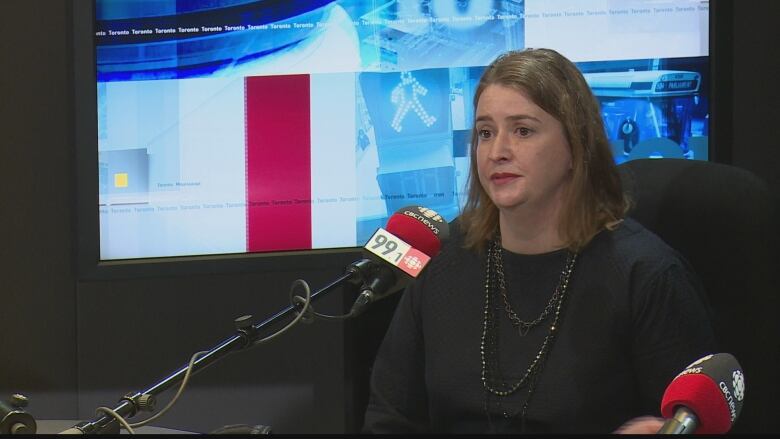'If I could go back and change it, I wouldn't': Cyclist hit by garbage truck works to help others
Margaret Harvey is spearheading a support group for trauma survivors at St. Michaels Hospital

A woman who was struck and nearly killed by a garbage truck while riding her bike to work says "if I could go back and change it, I wouldn't," because of what she's gained in life, including the ability to help others with a new support group for trauma survivors like herself.
It was in 2012 that Margaret Harvey was riding to work in the Gerrard Street bike lane when she began crossing the intersection at Yonge Street. A garbage truck cut her off, turning in front of her. The truck's back wheels ran her over.
"Once I realized that I was going to get hit and run over, I tried to get out of the way but there wasn't time," Harvey told CBC Toronto's Metro Morning on Wednesday.
When she realized she couldn't avoid the collision, "I just braced myself as best I could and I thought, 'Just please don't let me be paralyzed,'" she said. "I never had any thought of dying, though I was dying. I didn't know that."
After she was hit, she was relieved to find that she could still wiggle her toes. She was in a great deal of pain and felt cold, and was desperate just to close her eyes. But a nurse who was at the scene and rushed to help told her not to.
"She said, 'Don't close your eyes,' and she held my hand and she just comforted me the whole time," Harvey said. "And I never did get to thank her for that, so if she's listening, 'Thank you very much, you really saved my life.' A lot of people worked to save my life that day."
Slim chance of survival
Harvey's pelvis was crushed, she had "massive bleeds," soft-tissue damage, nerve damage and lacerations. Her bike's handlebars punctured her leg.
She had bolts and a stabilizer put into her pelvis and lived with that for four months. She had to undergo intensive physical therapy, and had cognitive behaviour therapy for post-traumatic stress.
Doctors told Harvey's husband that she had a 30 per cent chance of surviving the collision. Now, nearly five years later, she is not only telling her story on the radio, but also to other trauma survivors.
- Cyclist blasts motorists for driving up downtown bike lane
- Video captures brutal dooring of cyclist riding in Adelaide bike lane
As she went through her recovery from the collision, she discovered "a lot of inequity in health care, in the law, in insurance.
"There were so many systems that I had to navigate and I found issues in all of them."
Harvey knew she couldn't fix every problem. But she also didn't want what she went through with the collision and its aftermath to be in vain.
"The thing that I thought was achievable for me was pursuing this group," she said.
The program she is spearheading is called My BEST, which stands for "beyond surviving to thriving." It's a peer support group at St. Michael's Hospital, where Harvey was treated, for patients who have suffered traumatic injuries. Its first meeting will be on April 7.
'The course of my life changed forever'
The program connects survivors of trauma for peer mentoring and support. In 2015, the hospital treated nearly 1,000 patients for traumatic injuries. Ninety per cent of them survived.
"It was such a hard thing to go through," Harvey said. "You have this trauma and you think, 'Why? Why did this happen to me? This was just so not fair.' And then you realize that there's a lot of things in the world that are not fair."
Amanda McFarlan, a nurse at St. Mike's who is also the trauma program registry manager, hailed Harvey's work in an email to CBC.
"Margaret is a unique individual. Having sustained significant injuries, it would have been understandable if she had decided to focus all her energy on her recovery," McFarlan wrote. "Instead she has focused ... on looking for ways to provide other trauma survivors with support."
Harvey said she had always felt lucky her entire life until the accident. But she wouldn't change a thing.
"The course of my life changed forever that day and I've reached a point now where if I could go back and change it, I wouldn't because my life is good. There's a lot of good things that happened from that day. I learned a lot," Harvey said.
"And even though I've lost a lot, I've gained some stuff, too, and I think that's called post-traumatic growth and I think that that is achievable and I think that other people can get to that place, too."
With files from Metro Morning












_(720p).jpg)


 OFFICIAL HD MUSIC VIDEO.jpg)
.jpg)



























































































